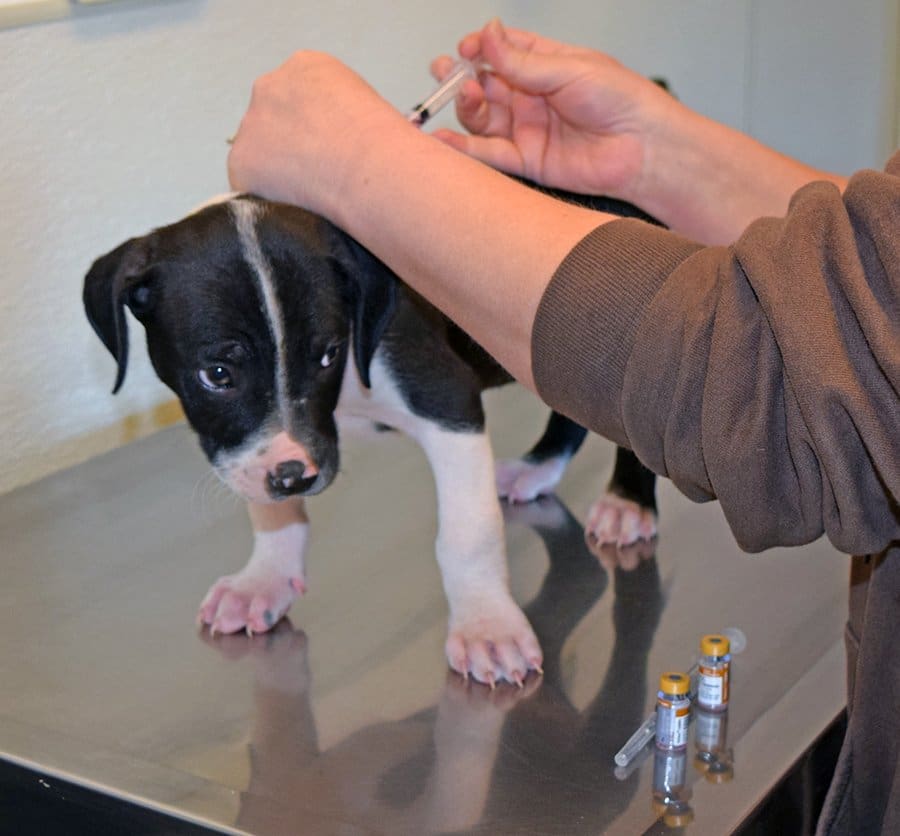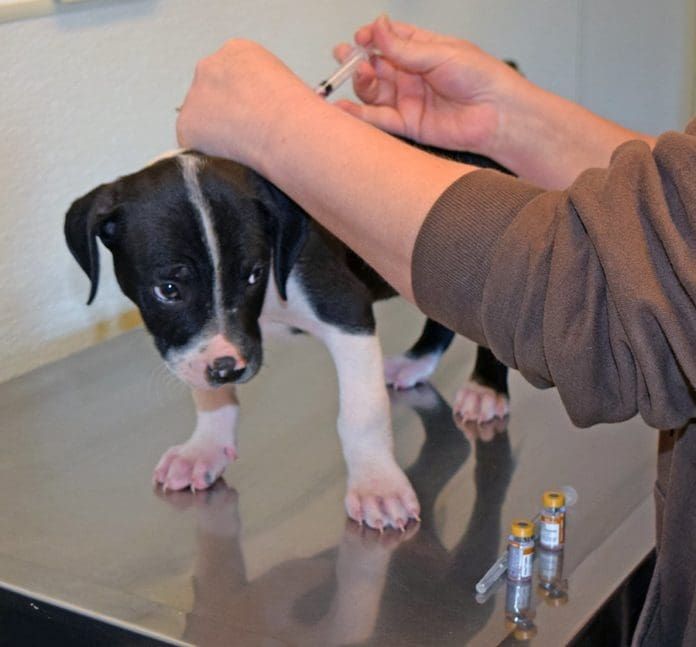Many people are surprised when they learn that there is NO single, correct way to vaccinate a puppy. (If you didn’t know that: seriously, there isn’t.)
For humans in the United States, there is a more-or-less universally accepted vaccination “schedule.” Published by the Centers for Disease Control and Prevention (CDC), it’s adopted and used by most pediatricians, unless the baby/child has a health condition that requires some modification of the vaccine protocol or the parents ask for modifications.
For dogs (and cats), it’s less universal. True, the American Veterinary Medical Association (AVMA) has some vaccination guidelines that it promotes, based on the work and recommendations of the American Animal Hospital Association (AAHA). The AAHA vaccination guidelines are the closest thing there is to a universally accepted canine vaccination protocol.

One reason for some of the variation in protocols is something that veterinarians might have in common with pediatricians – something I call the “old doctor” syndrome – the doctor who hasn’t changed his or her vaccination protocol since he or she graduated medical school and doesn’t see any reason to change it. This person might not be aware that AAHA has refined and reduced the number of “core” vaccines (distemper, parvovirus, adenovirus, parainfluenza, and a bit later, rabies) that puppies should receive, and is very specific about the conditions under which pups should receive non-core vaccines such as bordetella, leptospira, Borrelia burgdorferi (Lyme), and canine influenza (H3N8).
Younger veterinarians will surely be more aware that in recent years, many studies have indicated that puppies can be fully immunized with fewer vaccinations.
But another reason for some of the variability in puppy vaccinating protocols doesn’t generally arise when vaccinating human babies. It has to do with walk-in vaccination clinics and the availability of “do it yourself” vaccines sold in some pet supply stores. I’ve been present at clinics being held in pet supply stores where owners were being pressured to buy more vaccines than their puppies needed, and it made my stomach turn. People would ask, “Does my puppy really need this?” and the clinic technician would say something like,” Well, leptospirosis is a really bad disease…” without asking any sort of lifestyle questions, such as where the person and its owner live or what sort of areas they frequent on walks. Many small-breed dogs who live in apartments, as just one example, might never be in an environment where lepto is most commonly transmitted.
Another time, I was with my sister when she brought one of her small dogs to a vet clinic for a lameness exam. The veterinary technician who first came into the room asked my sister about the dog’s medical history, including vaccinations. She then proceeded to attempt to pressure my sister into giving the dog a number of core vaccinations that day, saying they were “due” (because the five year old dog had not been vaccinated in the past three years) and making a sales pitch for the rattlesnake venom “vaccine.” When my sister asked, “Is that really necessary?” the technician said, “Well, does the dog go into your yard?” In that case, I intervened and said firmly, “No vaccines today, thanks! We are just here for the lameness exam!”
Also, I don’t think ANY of the owners were told that they could ask for a vaccine titer test a couple of weeks after the last recommended “puppy shot.” Vaccine titer tests can confirm that the pups’ vaccinations had done what they were supposed to: cause the puppies’ immune system to develop its own antibodies to the diseases for which they were vaccinated, conferring as much protection from disease is possible to gain (without actually getting sick from and surviving the disease – a tactic which leaves the dog with higher levels of antibodies than those typically triggered by vaccination, but, of course, also risks the dog’s life!).
Vaccines shouldn’t be a matter of sales; in our opinion, owners should be fully educated about what is truly needed to protect their pets, and no more!
Articles about puppy vaccines:
1. The Deal with Puppy Shots
2. Time to Vaccinate the Dog?
3. Why Your Puppy Needs So Many Shots
Articles about vaccine titer testing:





